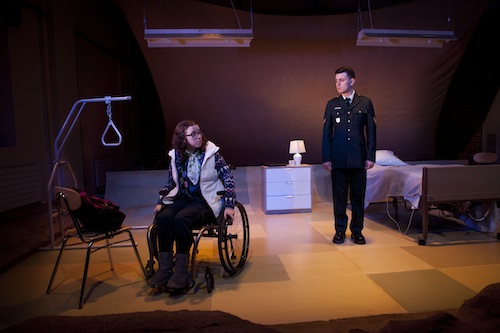 Armstrong’s War avoids the typical clichés, now playing on the Toronto stage
Armstrong’s War avoids the typical clichés, now playing on the Toronto stage
When I first heard the premise of Armstrong’s War (Canadian Rep Theatre) — a 12 year old, paraplegic Pathfinder scout attempts to earn a badge by reading to a 21-year-old Afghanistan War veteran in a rehab hospital — I feared it would be Lifetime Original Movie-style saccharine, ending with hugs and tears and life lessons learned.
I shouldn’t have worried. The play comes with some serious pedigree (playwright Colleen Murphy is a Governor General’s award winner, and it’s directed by Ken Gass), and though it does feature some tears and maybe even a lesson, it’s more unflinching than saccharine, and leaves us with questions rather than comforts.
The play (staged, appropriately, at the Citadel) doesn’t go for the typical clichés, and the twists are unexpected ones, sometimes even reversing expectations. Its structure has an established formula — six reading visits in 85 minutes — and the emotional beats and revelations come about when you think they’re going to, but it’s not paint-by-numbers. It is relatively unsentimental, and lampoons the overbearing, false pity that is often directed at the wounded, even taking a shot at the potential audience assumption that every play involving a veteran must be about the classic PTSD.
Corporal Michael Armstrong shows a lot of complexity, neither all tough-guy machismo nor utterly sensitive and defined by trauma. On the other hand, he’s also not fully defined, either. Paolo Santalucia makes him compelling, but I’d like to learn more about him and what motivates his various changes of heart.
Alex McCulloch as Hailey Armstrong (not related, but the common name motivated her choice of patient) gets the matter-of-fact, unsympathetic and self-centred eagerness of a precocious, driven child down pat, complete with the pronunciations of elevated vocabulary understood only from books. The realization that there’s only nine years between the characters’ ages is a sobering one, made clearer by the developing grudging respect and equality with which the characters treat one another.
Fitting for a play that’s set up as a series of reading sessions, there’s a lot of thematic material about the importance of stories and the narratives we tell about ourselves and to ourselves. The play suggests, as novelist Joan Didion wrote, “We tell ourselves stories in order to live.” Tragedy, pain, and cognitive dissonance lie in wait when these stories don’t match reality.
In terms of storytelling, the play also deals with matters of choice — is it better if we choose the misfortunes that befall us? Should we “script” our own life, or even our own downfall, to avoid the feeling of the world as a random and capricious place?
Much of the play is filtered through the reading of books and stories out loud, from childish mysteries to scenes from Stephen Crane’s The Red Badge of Courage, which serves as the main inspiration to the characters. It’s not necessary to have read Crane’s book to appreciate the play and its thematic impact, but those familiar with it will gain a richer understanding.
Sometimes the play stalls a bit when this reading occurs; it’s very in-character that the reading is not as natural as the interactions between the characters, but it demands a lot of audience focus, or it becomes a wash of words. When the stories get more personal to the characters, that problem disappears.
The set (Marian Wihak) positioned overtop the space that is usually a dance theatre, does double duty as a very realistic rehab hospital room and as a dash of Dali painting, a backdrop patch of sky in the midst of a barren wasteland. Between scenes, there is stirring, driven and mysterious sound design (Wayne Kelso) that impresses, but nonetheless occasionally seems at odds with the starker realism of the rest of the production.
At its heart, this is a story about the fear of being a burden, which argues for its own importance by showing us how stories can create connections and empathy. As we enter yet another country-wide discussion about who deserves our nation’s resources and support, that uncertain feeling as the lights go down seems very present: not sweet and neat, but real.
Details
- Armstrong’s War plays at The Citadel until December 6th. Performances run Tuesday to Saturday at 8 pm with Sunday matinees at 2 pm.
- Tickets range from $22-35, with PWYC Sundays, and can be purchased by calling the Arts Box Office at (416) 504-7529 or online. Sunday tickets may be purchased in advance, but PWYC tickets may only be purchased at the door.
- This production uses coarse language.
Photo of Alex McCulloch and Paolo Santalucia by John Lauener.
